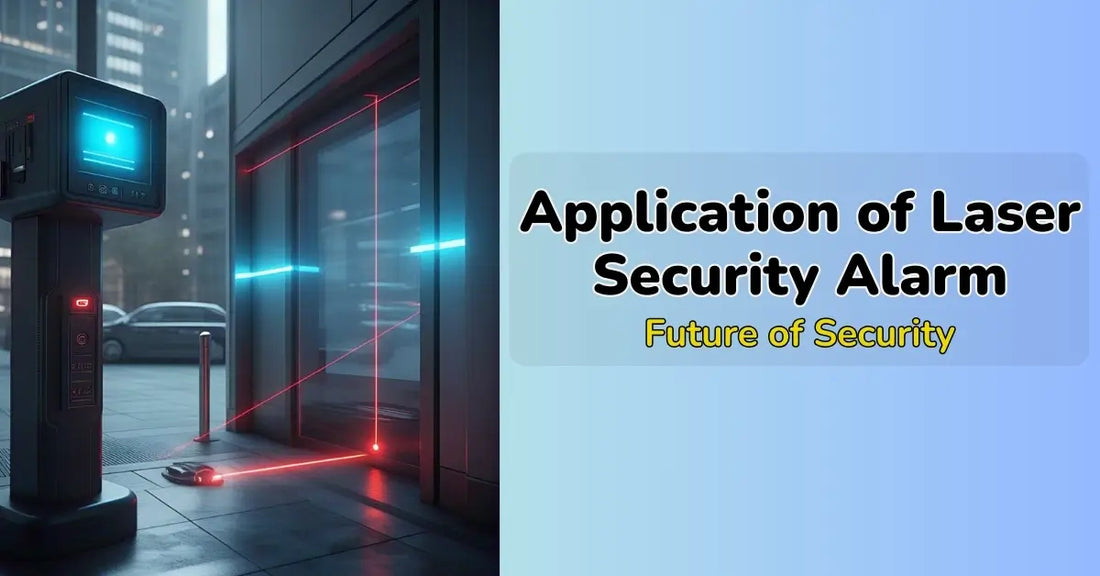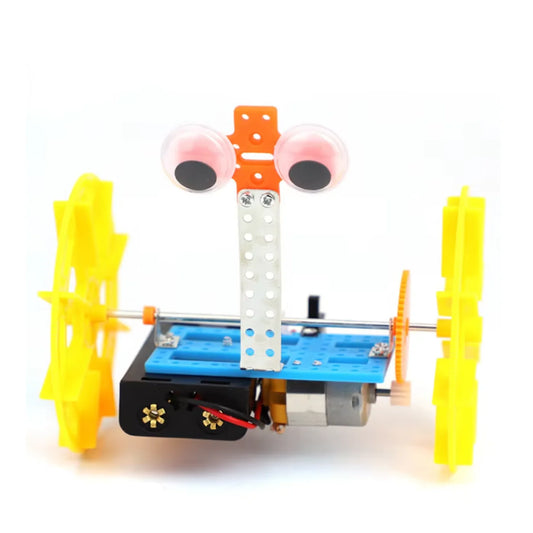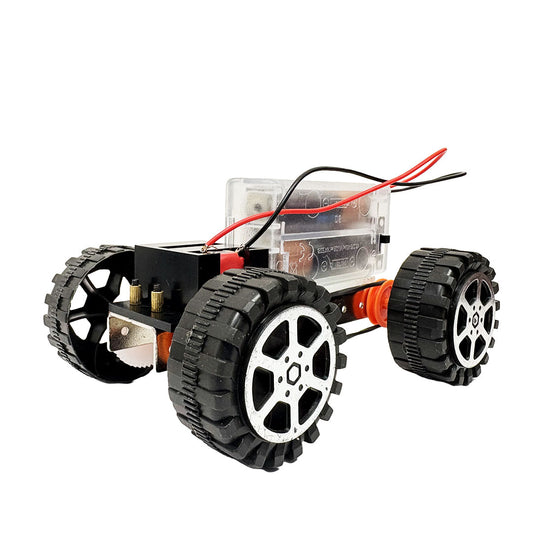
Application of Laser Security Alarm- Future of Security
IEM RoboticsTable of Content
-
What is a Laser Security System?
-
Application of Laser Security Alarm Systems
-
Uses of Laser Security Systems
-
Advantages of Laser Security Systems
-
Disadvantages of Laser Security Systems
- Conclusion of laser security system
Application of laser security alarm systems has become essential for safeguarding homes, businesses, and high-risk areas. Traditional security measures are often insufficient, making advanced technologies like laser security systems essential. These systems utilize laser beams to create an invisible protective barrier, detecting any unauthorized entry with high precision. Their efficiency, reliability, and adaptability make them a preferred choice for safeguarding properties, from residential areas to military installations.
Laser security alarm systems are widely used in various applications, including bank vaults, museums, research facilities, and industrial sites, ensuring enhanced protection against intrusions. This blog will delve into the application of laser security alarm systems, discussing how they work, the advantages and disadvantages of laser security systems, and their effectiveness in different real-world scenarios. Understanding their potential enables us to make informed decisions about implementing laser-based security for maximum protection.
Let’s explore this cutting-edge technology in detail.
What is a Laser Security System?
A laser security system is an advanced technology that utilizes laser beams to create an invisible yet highly effective protective barrier. This system continuously emits a laser beam between a transmitter and a receiver. When an object, person, or intruder crosses the beam, the connection is disrupted, triggering an alarm that alerts security personnel or the property owner.
As the products have high precision, reliability, and quick response time, laser security systems are widely adopted across various sectors. They are commonly used in residential properties to prevent unauthorized access, commercial establishments to protect assets, and military or high-security zones to detect intrusions in restricted areas. Their adaptability allows them to be integrated with other security mechanisms, such as CCTV cameras and motion detectors, enhancing overall security. As a result, laser security systems serve as a vital tool in modern security infrastructure.
Application of Laser Security Alarm Systems
Laser security alarm systems have revolutionized modern security by providing a highly reliable and efficient solution to prevent unauthorized access. These systems use laser beams to create invisible barriers, which, when interrupted, trigger an alarm. The precision and quick response time makes the product to use extensively across various sectors.
Below are some of the most common applications of laser security alarm systems:
1. Home Security
Home security is one of the most common application of laser security alarm systems. With the increasing threat of burglaries and unauthorized entries, homeowners rely on laser-based security to protect their properties. Laser sensors can be installed at doors, windows, balconies, and around the perimeter to detect movement. If an intruder crosses the laser beam, an alarm is triggered, alerting the residents and, in some cases, notifying law enforcement. This additional layer of security ensures peace of mind for homeowners.
2. Banks and Financial Institutions
Banks and financial institutions require top-tier security measures to protect valuable assets such as money, documents, and confidential data. Laser security alarms detect unauthorized access and are critical in securing vaults, ATM rooms, and restricted areas. These systems are often integrated with CCTV cameras and biometric scanners to provide multi-layered security. The high precision of laser security technology ensures that only authorized personnel can access sensitive areas, preventing theft or breaches.
3. Museums and Art Galleries
Museums and galleries house priceless artifacts, paintings, and historical objects requiring round-the-clock protection. Laser security systems create invisibl barriers around these valuable items, ensuring that any attempt to breach the security triggers an alarm. This application is particularly beneficial in exhibit halls and storage rooms, where movement needs to be monitored carefully. With laser security, museums can prevent theft, vandalism, or accidental damage to their collections.
4. Industrial and Commercial Buildings
Factories, warehouses, and corporate offices store valuable machinery, raw materials, and sensitive data. Unauthorized access to such locations can lead to financial losses and security risks. Laser security systems help monitor and restrict access to critical areas within industrial and commercial buildings. These devices protect research labs, server rooms, as well as inventory storage, ensuring authorized personnel have entry permissions.
5. Military and Government Installations
Military bases, research labs, and government buildings require the highest level of security. Unauthorized access to these facilities can pose serious national security threats. Laser security systems act as the first line of defense by detecting intrusions in restricted areas.
These systems work in combination with motion detectors, surveillance cameras, and biometric authentication to ensure maximum protection. Laser alarms can trigger immediate lockdowns or alerts in high-security zones to prevent potential threats.
6. Prisons and Detention Centers
Security in prisons and detention centers is paramount to prevent escape attempts and unauthorized entry. Laser security alarms are strategically installed around perimeter fences, gates, and restricted zones to detect any breach.
If a prisoner or an unauthorized person tries to cross the security barrier, the alarm is activated, allowing security personnel to respond swiftly. This technology helps maintain law and order within correctional facilities.
7. Parking Lots and Restricted Zones
Securing parking lots and restricted zones is another crucial application of laser security alarm systems. Controlling vehicle access is essential where VIPs, government officials, or high-value assets are involved.
Laser alarms are used in high-security parking areas, toll booths, and border security to monitor and regulate movement. By implementing these systems, authorities can prevent car thefts, unauthorized parking, and illegal access to restricted zones.
Uses of Laser Security Systems
Laser security systems are among today's most advanced and efficient security solutions. They use laser beams to create invisible protective barriers that detect unauthorized movement or intrusion. These systems are widely used in various sectors, offering unparalleled accuracy, reliability, and automation.
Below are the key uses of laser security systems and how they enhance safety in different environments.
1. Intruder Detection
One primary use of a laser security system is to detect intruders in restricted zones. The system can identify any movement that crosses its path by installing laser sensors at entry points, windows, hallways, and perimeters. The system immediately triggers an alert when an unauthorized person or object disrupts the laser beam. This function is especially valuable in homes, offices, warehouses, and military bases, where security breaches can lead to theft, data loss, or safety threats.
2. Restricted Access Control
Laser security systems are widely used to ensure that only authorized individuals enter sensitive areas. They are often integrated with biometric scanners, access cards, or keypads to provide multi-layered security. For example, laser alarms help prevent unauthorized personnel from accessing vaults, confidential files, or sensitive locations in banks, research labs, and government buildings. This use is critical in environments where data privacy, intellectual property, or national security is at risk.
3. Perimeter Protection
Protecting a property’s outer boundaries is essential to preventing intrusions before they happen. Laser security systems create virtual fences that detect unauthorized movement along the perimeter. These invisible barriers are highly effective in securing factories, airports, power plants, and military bases, where breaches could lead to severe consequences. Laser-based security offers continuous surveillance, minimal maintenance, and greater discretion, unlike traditional fencing.
4. Automated Response
One of the most significant advantages of laser security systems is their ability to work with automated security measures. When an intrusion is detected, the system can trigger a series of automated responses, such as:
● Activating security cameras to capture real-time footage.
● Sounding alarms to deter intruders and alert security personnel.
● Sending notifications to homeowners, business owners, or law enforcement via mobile devices.
● Locking down access points to prevent further unauthorized entry. This level of automation ensures a fast and effective security response, reducing the chances of security breaches going unnoticed.
5. Customizable Security Levels
Laser security systems can be tailored to suit different security needs. Whether for a residential property, a corporate office, or a high-security military base, these systems can be customized as follows:
● Detection range and sensitivity (adjustable for small or large spaces).
● Alarm triggers (sound alerts, silent notifications, or automated actions).
● Integration with other security systems (CCTV, motion detectors, biometric scanners, etc.).
This flexibility allows property owners and security professionals to implement personalized protection strategies that suit their requirements.
Advantages of Laser Security Systems
Laser security systems have gained popularity due to their high efficiency, reliability, and advanced features. Unlike traditional security methods, these systems offer an innovative and automated approach to protecting homes, businesses, and high-security areas. Here are some of the key advantages of laser security systems:
1. High Accuracy
One of the most significant benefits of laser security alarms is their precision in detecting intrusions. Unlike conventional motion detectors, laser-based systems significantly reduce false alarms caused by wind, moving leaves, or small animals. This ensures the alarm is only triggered when a breach occurs, making it highly reliable.
2. Fast Response Time
Laser security systems provide an instant response to a security breach. When an intrusion is detected, the system can sound an alarm, send notifications to security personnel, or trigger automated actions such as locking doors or activating surveillance cameras. This quick response helps prevent security threats before they escalate.
3. Invisible Protection
Unlike physical fences or barriers that can be visually unappealing, laser security systems create an invisible protective shield. This makes them an ideal security solution for residential properties, museums, and commercial buildings, where aesthetics are essential. Despite being invisible, they offer top-tier security.
4. Low Maintenance
Compared to traditional security systems, laser security alarms require minimal maintenance. Once installed, they operate efficiently with little need for repairs or adjustments, making them a cost-effective long-term security solution.
5. Integration with Other Security Systems
Laser security systems can seamlessly integrate with CCTV cameras, motion sensors, and alarm systems, creating a comprehensive security network. This allows for real-time monitoring and automatic threat detection, enhancing overall security.
6. 24/7 Surveillance
Laser security systems work around the clock without human intervention, providing continuous surveillance. Whether day or night, these systems ensure that your property remains protected at all times, offering peace of mind.
Disadvantages of Laser Security Systems
1. High Initial Cost
Laser security systems are more expensive than traditional security solutions, making them a significant investment.
2. Vulnerability to Environmental Factors
Heavy fog, rain, or dust may interfere with the laser beam, potentially reducing system efficiency.
3. Complex Installation Process
Setting up a laser security system requires professional installation, as improper alignment can lead to false alarms or inefficiency.
4. Power Dependency
Laser security systems require a constant power supply, making them vulnerable to power outages unless backed by an alternative power source.
Conclusion of laser security system
The application of laser security alarms is an advanced, reliable security solution with many applications. From protecting homes and businesses to securing government installations, these systems provide high accuracy, fast response times, and continuous surveillance. While they have drawbacks, such as high costs and environmental sensitivity, their benefits far outweigh the challenges. Investing in a laser security alarm is wise for those looking to enhance security. Stay ahead in safeguarding your property with cutting-edge laser security technology!








